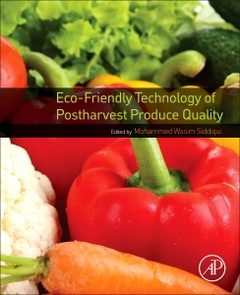Eco-Friendly Technology for Postharvest Produce Quality
Coordonnateur : Siddiqui Mohammed Wasim

Eco-Friendly Technology for Postharvest Produce Quality presents the scope of emerging eco-friendly technologies to maintain the postharvest quality of fresh produce in terms of safety and nutrition. The book covers an analysis of the alternative and traditional methodologies pointing out the significant advantage and limitations of each technique. It provides a standard reference work for the fresh produce industry in postharvest management to extend shelf life by ensuring safety first and then nutritional or sensory quality retention.
Fruits and vegetables are a huge portion of the food supply chain and are depended on globally for good health and nutrition. The supply of good food, however, greatly depends on good postharvest handling practices. Although substantial research has been carried out to preserve the quality of fresh horticultural produce, further research?especially on safety?is still required. This book provides foundational insights into current practices yielding best results for produce handling.
Chapter 2: Advances in Controlled Atmosphere Storage of Fruits and Vegetables
Chapter 3: Recent Trends in Active Packaging in Fruits and Vegetables
Chapter 4: Advances in Modified Atmosphere Packaging of Fruits and Vegetables
Chapter 5: Recent Developments of 1-Methylciclopropene (1-MCP) Treatments on Fruit Quality Attributes
Chapter 6: Impact of Brassinosteroids on Postharvest Physiology of Fruits and Vegetables
Chapter 7: Polyamines as an Eco-friendly Postharvest Tool to Maintain Fruit Quality
Chapter 8: Impact of Salicylic Acid on Postharvest Physiology of Fruits and Vegetables
Chapter 9: Chitosan: Properties and Roles in Postharvest Quality Preservation of Horticultural Crops
Recently, Dr Siddiqui was conferred the Young Achiever Award 2014 for the outstanding research work by the Society for Advancement of Human and Nature (SADHNA), Nauni, Himachal Pradesh, India. He is an Honorary Board Member of the SADHNA, Nauni, Himachal Pradesh, India. He has been an active member of the organising committees of several national and international seminars/conferences/summits.
Dr. Siddiqui acquired his B.Sc. (Agriculture) degree from Jawaharlal Nehru Krishi Vishwa Vidyalaya, Jabalpur, India. He received M. Sc. (Horticulture) and Ph. D. (Horticulture) degrees from Bidhan Chandra Krishi Viswavidyalaya, Mohanpur, Nadia, India with a specialization in the Postharvest Technology. He was awarded Maulana Azad National Fellowship Award from the University Grants Commission, New-Delhi, India. He is a member of the "Core Research Group" at the Bihar Agricultural University (BAU), providing appropriate direction and assisting to sensitize priority of the research. He has received several grants from various funding agencies to carry out his research projects. Dr. Siddiqui has been associated with postharvest technology and processing aspects of horticultural crops. He is dynamically indulged in teaching (graduate and doctorate students) and research, and he has proven himself as an active scientist in the area of Postharvest Technology. Dr. Siddiqui is an e
- Includes appropriate approaches, technologies, and control parameters necessary to achieve shelf-life extension without compromising produce quality
- Presents successful food safety methods between the time produce is harvested to consumption
- Includes the latest information on preservation technologies using novel chemical methods, active packaging, and monitoring the effect of environmental stresses on quality and shelf life of agricultural produce
Date de parution : 04-2016
Ouvrage de 324 p.
19x23.3 cm
Thème d’Eco-Friendly Technology for Postharvest Produce Quality :
Mots-clés :
1-MCP; active packaging; antimicrobial activity; antioxidant; antioxidant capacity; bioactive compounds; biological properties; biotic and abiotic stress; brassinosteroids; chilling injury; chitosan; controlled atmosphere; decay; edible coating; ethylene; ethylene receptor; food safety; fruit quality; fruits; fruits and vegetables; gaseous composition; MAP; minimally processed; modified atmosphere; nanocomposite; nutritional quality; packaging; phytochemicals; polyamines; polymer applicability
